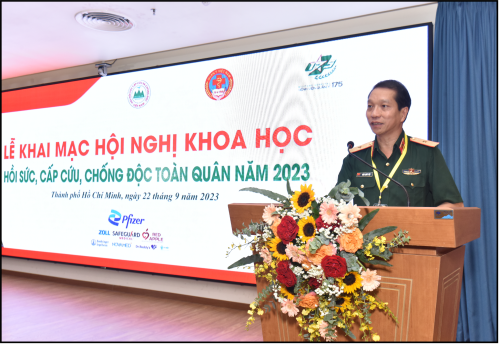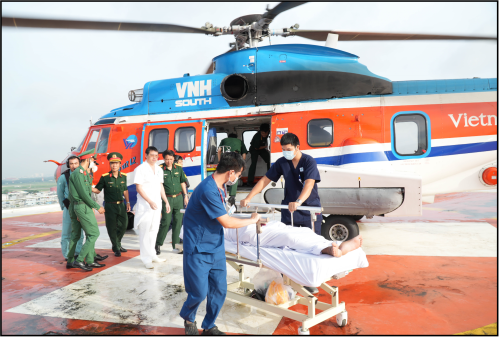Military Hospital 175, the top general hospital and the military medical centre in the South of the Army, is tasked with examining, treating, and caring for the health of high-ranking cadres of the Party, the State, the Army, and other individuals. Simultaneously, the Hospital also conducts and develops scientific research and stimulates international cooperation on medical aspects; trains civilian and military medical practice; provides guidance on expertise to lower-level military hospitals; and provides medical support for combat readiness and other tasks. Being deeply aware of the honour and assigned duties, over the years, the Hospital has accomplished tasks of treating and caring for the health of high-ranking cadres of the Party and the State; cadres, soldiers, and people, which contributes to the achievement of Military Medical sector and the national healthcare system. Currently, to meet the increasing demands of healthcare for various subjects, the Hospital’s Standing Committee of the Party Committee and Board of Directors have been actively leading and directing the comprehensive implementation of strategies and measures to build the Unit to meet the standards of a special-class hospital by 2025 to develop the Hospital into an intelligent multifunctional, and modern healthcare hub in the region by 2030.
 |
| Maj. Gen. Tran Quoc Viet speaks at a military-wide medicine conference |
To realise the above-mentioned goal, in parallel with consolidating the organisation of departments and boards, and improving the hospital model, Military Hospital 175 has concentrated on establishing a high-quality workforce and enhancing medical ethics for cadres and personnel in accordance with the principle of being “agile, compact, and strong in organisation, proficient in professional qualifications, and steadfast in politics, ideology, and ethics”. This is identified as an imperative and strategic measure. For great effectiveness, the Hospital has paid attention to leading and directing the construction and resolute implementation of planning, training, and developing a high-quality medical staff, including doctors, nurses, technical staff, etc. This includes emphasising the building of leading, specialised, and technically skilled personnel, exceptional technical staff, and young personnel majoring in new and modern fields namely internal medicine, surgery, emergency care, infectious diseases, and military medical specialisations that have been determined in the resolutions issued by the Hospital’s Party Committee. To that end, over the years, in addition to the focus on enhancing professional competence and creating a favourable environment for medical practitioners to utilise their talents and intelligence in fulfilling their duties, the Hospital has attached importance to effective and practical planning of workforce and combined the plans for training with effective arrangements of the staff. The Hospital has promoted various forms of training and combined training with on-the-job training in accordance with the principle of superiors training inferiors, experienced doctors providing training for inexperienced staff; invited leading experts to train and popularise experience, etc. At the same time, the Hospital has actively selected and detached cadres to further their intensive competencies and experience. In recent years, hundreds of medical practitioners from the Hospital have been sent for specialised training, including training for specialist degrees, master's degrees, and doctoral degrees, as well as practical training at major hospitals such as the University of Medicine & Pharmacy, Cho Ray Hospital, Oncology Hospital, and Military Central Hospital 108, as well as at advanced overseas healthcare institutions in the US, Australia, Germany, Japan, South Korea, and so on. The focus has been placed on implementing the construction of organ transplant programmes, establishing dynamic experimental models, and creating an environment for medical practitioners to extend their knowledge and skills. Simultaneously, the Hospital has actively recruited personnel with high qualifications, expertise, and skills to satisfy the criteria for political standards and reasonable remuneration policies to create a favourable condition and environment for work commitment and contribution without “brain drain”. With these measures, it is believed that by 2030, the hospital will have fundamentally established a high-quality workforce that is “proficient in medical theories, thoroughly conversant with medical techniques, and steadfast in the medical profession” to effectively use and operate modern infrastructure and equipment to deserve the best healthcare institution for cadres, soldiers, and people in the South.
In conjunction with building the workforce, the Hospital has actively invested in upgrading infrastructure and medical equipment in a modern and synchronised direction to lay a foundation for enhancing diagnostic and treatment capabilities; actively applied information technology and digital transformation in specialised activities and the management of the hospital quality. In recent years, the Hospital has completed phase 1 of the investment project and continued to implement phase 2; purchased numerous advanced and modern equipment to make a breakthrough in diagnosis and treatment. This has enabled the Hospital to successfully apply multiple advanced techniques in examining and treating patients.
 |
| The airborne emergency team transport patient from offshore island to the hospital |
To facilitate the digital transformation and its application in medical examination and treatment, for over a decade, the Hospital has invested in developing information technology infrastructure and hospital management software to interconnect various departments and processes, from outpatient treatment to inpatient management, diagnostic imaging, laboratory testing, pharmacy, equipment, etc. The Hospital has been implementing quality improvement initiatives in organisation and patient care with 31 quality improvement projects (10 of which have been tested and put into operation). The Hospital continues to invest in developing information technology infrastructure and hospital management software to build an electronic health record system. Simultaneously, patients’ information has been integrated into personal health records with individual codes so that they can self-monitor their health conditions, which enables the Hospital to catch up with the trend of scientific and technological development. The hospital has effectively managed and operates electronic health records, which enables patients to check results through phones or computers via the hospital's website or mobile application. Through these efforts, the Hospital has promoted the remote medical examination service, home care, and the reception, treatment, care, and recovery process for patients, as well as access to high-quality international standard medical services for people through quick and efficient access to testing, screening, and regular health check-ups. Currently, the Hospital has implemented the seamless exchange of electronic documents and carried out plans, instructions, announcements, conclusions, etc., on the military data transmission network and the internal network system. The Hospital has expanded the registration methods for medical examination through the Hotline 19001175, the mobile application named BVQY 175 on App Store or CH Play, and the Kiosk system, etc. The Hospital also introduced ID card reader devices or the VssID card to integrate patient information, reducing waiting time for registration and treatment. Diagnostic imaging results through the Picture Archiving and Communication System (PACS) for computed tomography (CT) and magnetic resonance imaging (MRI) have been stored and delivered.
To approach and keep pace with the development of science and technology in the medical field, the Hospital has intensified research and applied science in diagnosis and treatment. The research conducted by the Hospital has adhered to protecting and caring for the health of service members and the people in the new situation with the focus on researching and applying the development of new, advanced techniques in diagnosis and treatment. In recent years, the Hospital has successfully conducted 3 national-level scientific research projects, 21 ministry-level topics, and 300 grassroots-level projects. A notable project entitled “Application of self-made antibiotic cement hip moulds in the treatment of infection in artificial hip joints” received the Youth Innovation Award in the Army in 2022. In 2023 alone, the Hospital implemented 1 national-level project (Researching and evaluating the effectiveness of the pre-hospital emergency model), 5 ministry-level projects, and 104 grassroots-level projects. Additionally, the Hospital successfully organised 2 major scientific conferences on improving the quality of the out-of-hospital stroke emergency network and the whole-army emergency intensive care against toxins; 10 seminars, 4 training programmes, and dozens of internal scientific activities. These achievements serve as an important foundation in the process of building a specialised and versatile hospital to meet regional standards.
Moreover, the Hospital has actively expanded cooperation in the field of healthcare to absorb knowledge, modern specialised techniques, and advanced healthcare models at both domestic and international institutions. This content is of utmost importance in building a modern hospital. Accordingly, the Hospital has actively expanded healthcare cooperation with more than 40 partners from 11 countries to cater for studying, researching, training, transferring, developing, and mastering modern techniques. In addition to partnerships to develop professional qualifications, the Hospital has also engaged in collaborations to ensure the competencies of the personnel for both domestic and international tasks including cooperating with the Australian Embassy to enhance language proficiency, cooperating with the US military medical forces to improve emergency capabilities, etc. to effectively meet the task requirements of participating in UN Peacekeeping Forces, providing healthcare for service members and civilians at the large Spratley Island Health Centre, conducting search-and-rescue missions, and responding to other emergency tasks.
Building a specialised, versatile, and modern Medical Hospital 175 to meet regional standards is a correct guideline and a major goal. The implementation process has faced countless difficulties and challenges, but with strong determination, high resolve, and the achieved results, the Hospital is certain to successfully achieve the set goals to meet the healthcare requirements for cadres, soldiers, and the people in the new circumstances.
Major General, Ph.D. Doctor TRAN QUOC VIET, Director of Military Hospital 175